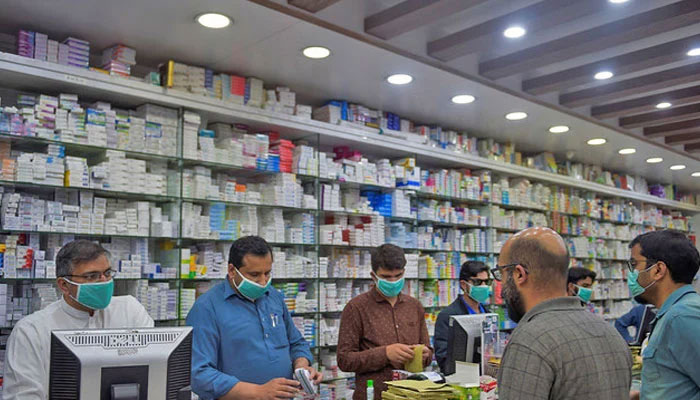DRAP set to train pharmacists to tackle self-medication, AMR threat
MoU was signed by Asim Rauf, Chief Executive Officer (CEO) of DRAP
ISLAMABAD: The Drug Regulatory Authority of Pakistan (DRAP) has decided to train hundreds of pharmacists across Pakistan to control the practice of self-medication, address the growing threat of Antimicrobial Resistance (AMR) due to the widespread and unnecessary use of antibiotics, and monitor adverse drug reactions, officials said on Wednesday.
The decision was taken after studies indicated that approximately 76% of university students in Islamabad practised self-medication due to “convenience and the perceived minor nature of their ailments,” while a community-based study in Karachi indicated that about 63% of respondents engaged in self-medication. Analgesics, antipyretics, and antibiotics were the most commonly used medications.
“Today, DRAP and the Pakistan Pharmacists Association (PPA) signed a Memorandum of Understanding (MoU) for the training of pharmacists across Pakistan to enhance their role in improving the quality of medicines, eliminating the practice of self-medication, and addressing the Antimicrobial Resistance (AMR),” Sardar Shabbir Ahmed, President PPA, told The News.
The MoU was signed by Asim Rauf, Chief Executive Officer (CEO) of DRAP, and Sardar Shabbir Ahmed, President of PPA after the Executive Council of PPA and DRAP authority gave the green light.
“This MoU would enhance the technical capacity of pharmacists in various domains of the healthcare system,” Sardar Shabbir added.
He maintained that PPA will arrange activities for capacity-building in the form of seminars, workshops, and symposiums, and DRAP shall provide technical resources.
“Pharmacists in Pakistan play a pivotal role in the healthcare system, serving as key professionals in manufacturing quality-assured therapeutic goods, handling their supply chain, and ultimately dispensing,” he said, adding that they also have a key role in the clinical side by ensuring optimization of patient outcomes and monitoring adverse drug reactions in the form of Pharmacovigilance.
“The PPA’s main goal is to improve the knowledge of pharmacists and it has organized events in collaboration with DRAP to enhance the quality of pharmaceuticals and professional handling,” Sardar Shabbir added.
-
 James Van Der Beek Loved Ones Breaks Silence Fundraiser Hits $2.2M
James Van Der Beek Loved Ones Breaks Silence Fundraiser Hits $2.2M -
 Disney’s $336m 'Snow White' Remake Ends With $170m Box Office Loss: Report
Disney’s $336m 'Snow White' Remake Ends With $170m Box Office Loss: Report -
 Premiere Date Of 'Spider-Noir' Featuring Nicolas Cage Announced
Premiere Date Of 'Spider-Noir' Featuring Nicolas Cage Announced -
 Pedro Pascal's Sister Reveals His Reaction To Her 'The Beauty' Role
Pedro Pascal's Sister Reveals His Reaction To Her 'The Beauty' Role -
 Kate Middleton Proves She's True 'children's Princess' With THIS Move
Kate Middleton Proves She's True 'children's Princess' With THIS Move -
 Paul Anka Reveals How He Raised Son Ethan Differently From His Daughters
Paul Anka Reveals How He Raised Son Ethan Differently From His Daughters -
 'A Very Special Visitor' Meets Queen Camilla At Clarence House
'A Very Special Visitor' Meets Queen Camilla At Clarence House -
 Jodie Turner Smith Shares One Strict Rule She Follows As A Mom
Jodie Turner Smith Shares One Strict Rule She Follows As A Mom -
 Hailey Bieber Reveals KEY To Balancing Motherhood With Career
Hailey Bieber Reveals KEY To Balancing Motherhood With Career -
 Photo Of Jay-Z, Other Prominent Figures With Jeffrey Epstein Proven To Be Fake
Photo Of Jay-Z, Other Prominent Figures With Jeffrey Epstein Proven To Be Fake -
 Hillary Clinton's Munich Train Video Sparks Conspiracy Theories
Hillary Clinton's Munich Train Video Sparks Conspiracy Theories -
 Fans Slam Talk Show Host For 'cringe' Behavior In Chris Hemsworth Interview
Fans Slam Talk Show Host For 'cringe' Behavior In Chris Hemsworth Interview -
 Woman Jailed Over False 'crime In Space' Claim Against NASA Astronaut
Woman Jailed Over False 'crime In Space' Claim Against NASA Astronaut -
 James Van Der Beek’s Close Pal Reveals Family's Dire Need Of Donations
James Van Der Beek’s Close Pal Reveals Family's Dire Need Of Donations -
 Prince William And Harry's Cousins Attend 'Wuthering Heights' Event
Prince William And Harry's Cousins Attend 'Wuthering Heights' Event -
 Hailey Bieber Turns Heads Just Hours After Major Business Win
Hailey Bieber Turns Heads Just Hours After Major Business Win




